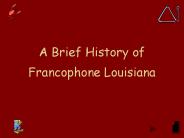ALABAMA REMEMBERS THE CIVIL RIGHTS MOVEMENT - PowerPoint PPT Presentation
1 / 34
Title:
ALABAMA REMEMBERS THE CIVIL RIGHTS MOVEMENT
Description:
During the 1950s and 1960s Alabama was the site of some of the most ... Brown Chapel AME Church was the starting place for the 1965 Selma to Montgomery marches. ... – PowerPoint PPT presentation
Number of Views:99
Avg rating:3.0/5.0
Title: ALABAMA REMEMBERS THE CIVIL RIGHTS MOVEMENT
1
ALABAMA REMEMBERS THE CIVIL RIGHTSMOVEMENT
By Ann-Marie Peirano
2
- During the 1950s and 1960s Alabama was the site
of some of the most intense Civil Rights
struggles in the country. - Montgomery, Selma, Birmingham, and Tuscaloosa led
the resistance against inequality, racism, and
hatred.
3
The Civil Rights Movement in Montgomery, Alabama
4
- In Montgomery on December 1, 1955 Rosa Parks was
arrested for refusing to give up her seat to a
white man on a segregated city bus. - The next night, African American community
leaders met in the Dexter Avenue Baptist Church
to organize a massive bus boycott.
5
- Martin Luther King, Jr. became the movements
captivating leader. - After a year of boycotting the protesters won a
federal case forcing the desegregation of the
busing system.
6
- The Civil Rights Movement is remembered in
Montgomery today.
7
In 1989 the Southern Poverty Law Center dedicated
the Civil Rights Memorial in Montgomery, Alabama.
Maya Lin created the structure, which is made of
black granite and honors forty individuals who
gave their lives fighting for civil rights.
8
The Dexter Avenue Baptist Church was the rallying
place for participants of the 1955-1956
Montgomery bus boycott.
9
The name of the church was changed to Dexter
Avenue King Memorial Baptist Church in honor of
Dr. Martin Luther King, Jr. who served as pastor
from 1954 until 1960.
10
The Civil Rights Movement in Tuscaloosa, Alabama
11
- In the spring of 1963, The University of Alabama
was ordered by the court to enroll an African
American student. - A few months earlier, George Wallace had been
inaugurated as Governor.
12
- During his campaign, Wallace had declared,
Segregation now! Segregation tomorrow!
Segregation forever! - When African American students tried to register,
Wallace blocked the entrance to Fosters
Auditorium, making his famous stand in the
school house door.
13
- The University of Alabama holds an annual March
to the Schoolhouse Door to honor the courage of
those who challenged segregation.
14
Foster Auditorium in Tuscaloosa, Alabama
15
George Wallace attempted to block Vivian Malone
and James Hood from enrolling at The University
of Alabama.
16
In 1965, Vivian Malone became the first African
American to graduate from The University of
Alabama.
17
James Hood returned to the University in 1997 to
earn his doctorate.
18
The Civil Rights Movement in Birmingham, Alabama
19
- In 1963, Martin Luther King, Jr. led protesters
in Birmingham, where Police Commissioner Eugene
Bull Connor used dogs, cattle prods, tear gas,
and fire hoses on the demonstrators.
20
- On September 15, 1963 the violence reached a
bloody climax when a bomb was set off at the
Sixteenth Street Baptist Church. - Four little girls were killed by the explosion,
which took place on a Sunday morning.
21
- Today Birmingham honors those who sacrificed for
the cause of human dignity.
22
The site of the Sixteenth Street Baptist Church.
23
The sign outside of the Sixteenth Street Baptist
Church. Robert E. Chambliss, Thomas Blanton Jr.,
and Bobby Frank Cherry were convicted of the
bombing. Cherry was not convicted until 2002.
24
The Birmingham Civil Rights Institute honors
those who fought for human dignity during the
Civil Rights Movement.
25
The Civil Rights Movement in Selma, Alabama
26
- Martin Luther King Jr. organized a march from
Selma to Montgomery on Sunday, March 7, 1965. - The purpose was to focus attention on voting
rights for African Americans. - Police and state troopers met protesters on the
Edmund Pettus Bridge and savagely beat them.
Sixty were injured, and sixteen had to be
hospitalized because of severe injuries.
27
- The nation was outraged and President Johnson was
prompted to pledge his support for voting rights
legislation. - On March 21, protesters finally completed their
march from Selma to Montgomery.
28
- Selma has not forgotten the events of the past.
29
Brown Chapel AME Church was the starting place
for the 1965 Selma to Montgomery marches.
30
Brown Chapel AME Church
31
The Church also housed the Southern Christian
Leadership Conference (SCLC) for several months
in 1965.
32
Civil rights demonstrators marched across the
Edmund Pettus Bridge on their way from Selma to
Montgomery in 1965.
33
The National Voting Rights Museum, located in
Selma, Alabama, commemorates the struggle to
bring about the Voting Rights Act of 1965.
34
In Selma there are many memorials honoring the
Civil Rights Movement.































